谈谈英语的正式和非正式语体
英语写作中的文体差异

英语写作中的文体差异英语作为一门国际语言,在不同的文化和语境中都有其独特的表达方式。
而与其它语言相比,英语更是拥有多种文体,这也给英语写作带来了更多的选择和挑战。
首先,我们可以看到英语写作中最基础的两种文体:正式和非正式。
正式文体通常在学术、商务等场合中使用,要求语言精准、规范、符合语法和语义规则,并且多采用被动语态和介词短语等较为复杂的句式。
而非正式文体则相对轻松随意,语言更富于表现力和口语化,多用简单句和俚语来表达言辞。
我们可以通过以下两个例子来感受这种不同:正式文体例子:The user experience of this product ought to be optimized in order to achieve an optimal level of satisfaction among customers.非正式文体例子:This product should feel good to use so that more people want to buy it and recommend it to their friends.显然,正式文体更适用于需要呈现严谨、专业和严肃的场合,如学术论文、商务合同等;而非正式文体更适用于需要表达轻松愉悦、亲切和随意的场合,如个人日记、社交媒体等。
除此之外,英语写作中还存在各种专门的文体,如散文、诗歌、小说、科幻等。
这些文体都有自己独特的特点和风格。
例如,散文通常以自由流畅的句子和修辞手法为主,试图表达作者内心的情感和思想;而诗歌则更强调押韵、韵律和音乐性,意在创造出优美的声音效果。
此外,在不同文化和语境中,英语写作也存在着更为细微的文体差异。
例如,在美国和英国的英语写作中,常用的单词、句法和修辞手法都略有不同。
在美国英语中,常使用第一人称代词“I”和“we”,而在英国英语中则多用第二人称代词“you”和第三人称代词“one”。
在句子结构上,美国英语更为简洁明了,而英国英语则更偏重于修辞和间接表达。
英语正式文体与非正式文体的区别

老师在批改学生作文时,普遍有一种感觉:学生的作文大多用词简单、结构松散,从语体角度分析,正式程度都较低,呈口语化的倾向。
很多同学在写作时都忽略了大作文对正式文体的要求。
正式文体与非正式文体的区别表现在用词、语法上。
以2009年的大作文为例,该作文为图画作文,图画是一张蜘蛛网上有很多人上网。
图画中的中文提示词为:互联网的“远与近”,题目给出的要求是考生简要描述图画,阐明其含义,并发表评论。
下面特意选择了考生大作文中普遍存在的非正式用语,并给出相应的正式用语进行比较。
两种文体在语言特征上的主要差异首先表现在用词上,体现在以下几个方面:1.正式文体常使用正式用语,非正式文体则常使用非正式用语,这两类不同的用语是在长期的使用过程中被约定俗成地固定下来的。
比如以下非正式用语一栏中的词汇在考生大作文中普遍存在,可修改为右栏正式用语中的表达:具体而言,源于法语、拉丁语、希腊语的词语多用于正式文体;源于古英语的词语则多用于非正式文体。
试比较:We should investigate the root cause of the problem.We should look into the root cause of the problem.Investigate源于拉丁语,属正式文体用语,而look into是古英语词汇成分,属非正式文体用语。
2. 现代英语中的缩略词及缩约词多用于非正式文体,其相应的非缩略或非缩约形式则常出现在正式文体中。
很多考生都忽略了这一区别,以下非正式用语栏中的表达都是从考生大作文中选出的,可修改为右栏正式用语中的表达。
Informl: People can’t put up with the alienation brought by the Internet.3. 很多考生使用了很多短语动词,而这正是非正式文体的一大特征,正式文体则常用与之同义的单个动词。
试比较:Formal: Individuals cannot tolerate the alienation brought by the Internet.Informal: In this day and age, many people can make use of theInternet via computers or mobile phones.Formal: In this day and age, many individuals can utilise theInternet via computers or mobile phones.两种文体在语言特征上的第二类主要差异体现在语法上,具体包括以下几个方面:1.在构成比较句型时,很多考生选择使用了人称代词的宾格形式,其实使用人称代词的主格形式要显得更正式些。
正式和非正式文体 Formal and Informal Styles

- Alvin Toffler
长句long sentences 平行结构parallel constructions 插入语parenthetical remark 从句clauses 被动语态passive voice 抽象意思的词语:words and phrases have abstract meanings 比喻Metaphors
5 (that) she would come.
He told me (that) he liked the house.
I think (that) it's a good idea.
6)非正式文体中,they可以指代 everyone, everybody, someone, somebody, anyone, anybody, no one, nobody, e.g. Has everyone finished doing their exercises? Has everyone finished doing his or her exercises? (Formal)
The old lady treated him as if he was her own son. I wish he was here with us.
8)非正式文体中,常用省略疑问句和缩略分句: What for? Want a drink? She came yesterday.
9)分词短语和无动词分句一般用于正式文体: Having been warned of the impending storm, the captain decided to put off the voyage. When the captain heard a storm was coming, he decided to put off the voyage. (Less formal) Badly defeated in the match, the team returned in low spirits. The team was badly defeated in the match, and they returned in low spirits. (Less formal) She decided to go home at once, knowing that her mother was anxiously waiting for her. She decided to go home at once. She knew her mother was anxiously waiting for her. (Less formal)
不同语言的社会语言使用规范

不同语言的社会语言使用规范在当今社会,语言的使用规范是交流和沟通的重要基础。
不同的语言拥有不同的社会语言使用规范,这些规范反映了语言所处文化和社会的特点。
本文将就不同语言的社会语言使用规范进行探讨。
一、英语的社会语言使用规范英语作为国际通用语言之一,其社会语言使用规范对全球范围内的交流有着重要的影响。
以下是英语社会语言使用规范的几个方面:1. 正式语言与非正式语言:英语中存在着正式语言和非正式语言之间的区别。
正式语言通常在正式场合使用,如商务会议、学术演讲等;而非正式语言则主要用于日常交流和非正式场合,如朋友间的对话、社交聚会等。
2. 社交礼仪:英语社交中注重礼貌和尊重。
遵守社交礼仪,如问候语的使用、表达谢意等,是英语社交语言的重要方面。
同时,在英语社交中也要注意避免敏感话题和侮辱性语言的使用。
3. 文化背景的考虑:英语社会语言使用规范也受到文化背景的影响。
不同的文化对待问题的方式和态度差异较大,因此在使用英语进行交流时要注意尊重对方的文化差异,避免因误解导致交流不畅或冲突的发生。
二、汉语的社会语言使用规范汉语作为世界上使用人数最多的语言之一,其社会语言使用规范体现了中国的传统文化和社会习惯。
以下是汉语社会语言使用规范的几个方面:1. 尊称与礼貌语:汉语中有丰富的尊称词汇,如“先生”、“女士”等。
在中国社会中,尊称的使用与礼貌形成共识,对于长辈、上级、客人等使用尊称表达敬意是一种常见的社会规范。
2. 谦虚与含蓄:汉语中注重谦虚和含蓄的表达方式。
在汉语社交中,夸奖他人应该使用委婉的措辞,避免过于直接的赞美,同时也要注意不给他人带来压力或尴尬。
3. 利用成语和典故:汉语社会语言使用规范中涉及使用成语和典故。
成语是汉语中的独特表达方式,对于熟练应用成语可以增加语言的韵味。
典故则是汉语文化中的宝贵资源,合适地引用典故可以更好地传达思想和情感。
三、西班牙语的社会语言使用规范西班牙语是西班牙、墨西哥等国家的官方语言,也是世界上使用人数较多的语言之一。
论英语语域与语体
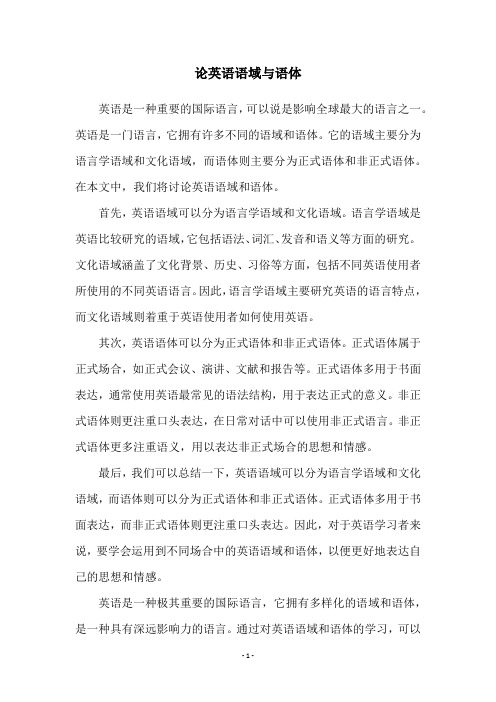
论英语语域与语体
英语是一种重要的国际语言,可以说是影响全球最大的语言之一。
英语是一门语言,它拥有许多不同的语域和语体。
它的语域主要分为语言学语域和文化语域,而语体则主要分为正式语体和非正式语体。
在本文中,我们将讨论英语语域和语体。
首先,英语语域可以分为语言学语域和文化语域。
语言学语域是英语比较研究的语域,它包括语法、词汇、发音和语义等方面的研究。
文化语域涵盖了文化背景、历史、习俗等方面,包括不同英语使用者所使用的不同英语语言。
因此,语言学语域主要研究英语的语言特点,而文化语域则着重于英语使用者如何使用英语。
其次,英语语体可以分为正式语体和非正式语体。
正式语体属于正式场合,如正式会议、演讲、文献和报告等。
正式语体多用于书面表达,通常使用英语最常见的语法结构,用于表达正式的意义。
非正式语体则更注重口头表达,在日常对话中可以使用非正式语言。
非正式语体更多注重语义,用以表达非正式场合的思想和情感。
最后,我们可以总结一下,英语语域可以分为语言学语域和文化语域,而语体则可以分为正式语体和非正式语体。
正式语体多用于书面表达,而非正式语体则更注重口头表达。
因此,对于英语学习者来说,要学会运用到不同场合中的英语语域和语体,以便更好地表达自己的思想和情感。
英语是一种极其重要的国际语言,它拥有多样化的语域和语体,是一种具有深远影响力的语言。
通过对英语语域和语体的学习,可以
帮助英语学习者提高英语水平,更好地用英语表达自己的想法,发挥英语的巨大潜力。
正式英语与非正式英语

正式英语与非正式英语外刊文章有时候确实会出现一些非正式表达,而使用这些表达的目的是让文章更有趣,可读性更强。
但考场写作里面不建议使用这些非正式表达,以免出现风格问题。
判断一个表达是否正式最简单的方法是查词典,比如rake something in这一短语在朗文词典中带有informal标志,说明它是非正式表达。
这里展开讲讲英语中正式表达和非正式表达的主要区别:(1)两者词源有所区别目前英语中有部分词汇来源于盎格鲁-撒克逊人的语言(即古英语),还有部分来源于法语、希腊语以及拉丁语。
一般来说,来源于法语、希腊语以及拉丁语的词汇更为庄严,更多用在正式场合,比如:residence, prestige, bourgeois, interrogate, ascend, conclude, investigate, surrender,而来源于古英语的单词会更为大众化,一般用在中性或非正式场合,比如:fire, shut, begin, home, hunt, end, look等等。
根据场合不同,人们可能会选用不同的词汇,比如:(a) They are investigating the matter. (formal)(b) They're looking into the matter. (informal)**个句子中investigate是一个源于拉丁语的单词,它的用法比较正式,第二个句子中look into源于古英语,用法更为大众化。
又比如,丘吉尔在二战演讲中有这样一句名言:We shall fight on the beaches, we shall fight on the landing grounds, we shall fight in the fields and in the streets, we shallfight in the hills; we shall never surrender…前几个排比句全部用上了盎格鲁-撒克逊词,直到最后一句才用上了中古法语源单词surrender,而这一单词的使用也让句子更具气势。
正式英语和非正式英语

正式英语和⾮正式英语⼤家平时接触到的,熟悉的基本都是⾮正式英语,正式英语更严肃,⽤的单词较长也相对不太常见。
但是有时候⼯作中还是要⽤到formal english,所以简单介绍⼀下。
⼀、正式英语正式英语主要应⽤于写作,学术课本,⼤学论⽂,商业信函和合同中。
官⽅或者正式场合。
特点:⽐informal english使⽤更多的复杂词汇。
⽐如compensate补偿,ascend上升,interrogate审问。
常常使⽤单个动词(⽐如establish)来代替动词短语(⽐如set up)。
formal english⽤在写作中,句⼦⼀般较长,较复杂,严格遵循语法规则。
⽐较客观,经常使⽤it这样的⾮⼈称代词和动词的被动形式。
避免缩略词和缩写单词。
就连标点符号也⽐较正式,避免⽤分号(;)和冒号(:)⼆、⾮正式英语informal english基本就是⽇常⽤语和⼀些流⾏英语。
⽐较随意,对词汇的选择不太在意。
特点:⽐formal english使⽤较短的单词,⽐如fire,climb,ask。
使⽤很多⼝语词汇。
⽐如stuff,a lot of, thing,sort of经常使⽤⼀些动词短语较短,语法要求也没有formal english严格写作相⽐formal english更个⼈化,常⽤第⼀,第⼆⼈称(I,you,we)。
经常缩写单词(如常常使⽤it’s,⽽不是 it is)分号(;)和冒号(:)可以⽤Tips:俚语是informal english,不适合在礼节性的演讲和正式场合⽤。
俚语常是在固定的社会团体或职业⼈群使⽤。
三、把⾮正式英语转为正式英语有时候⼯作中发邮件不能向平时说话那么随意,我们需要把formal enlish 改成informal english,关键的关键是把动词短语改成单个动词。
要求 ask for -> request建⽴ set up -> establish发现 find out -> discover处理 deal with -> handle欺骗 take in -> deceive下⾯是⼀些例句⾮正式⽤语正式⽤语他调查了(checked up on)他的会计。
浅谈英语中的“正式英语”与“非正式英语”

浅谈正式英语与非正式英语有何不同文章来源:乐知英语小站。
喜欢我们的文章,就来我们的英语小站看吧,有大量精选的英语干货以及各种欧美趣谈,资料每天都有更新。
想学英语,也可以听外教老师讲课哟。
听课地址:/sessionhall.html?uid=sophie在开始主题之前,我们先以日常衣着来体会一下:你会穿成下面左图那样去job interview(面试)吗?你会穿成下面右图那样去海滩玩吗?同理,英语也分场合有正式和非正式之分。
正式英语(formal English)是比较严谨、庄重的语体。
其特点是在词汇、句子、语音方面都必须严格遵守民族标准语言的规范。
它所表达的是作者与读者直接的一种非个人的关系,它力求不借助其它非语言表达方式如面部表情、手势等来准确地表达思想。
而反过来说,非正式英语(informal English),又称口头英语(spoken English)或日常交谈语体。
其特点是多少有些脱离标准语言规范,用词比较自由,句型结构比较简单。
它体现出说话者和听者之间试图建立一种随和的、轻松的、亲密的关系。
在什么场合选择哪种正式程度的语言表达是一个十分重要的问题。
有的情况下,用太过正式或太过不正式的语言都会给别人留下不好的印象(bad impression)。
那么,正式与非正式英语用法是怎样的呢?1.复杂的单词(complicated vocabulary)vs 简短的单词(short words)比如说,fatigued(疲惫的)vs tired(疲惫的)、explode(爆炸)vs blow up(爆炸)、reduce(减少)vs cut down(减少)等等。
2.复杂长句(long and complicated sentences)vs 简单短句(simple sentences)比方说,“虽然当前经济十分强盛,但一些专家预言经济衰退即将来临”正式:The economy is currently quite robust; nevertheless, some specialists predict an imminent recession.非正式:The economy is very strong right now, but some specialists say we’ll have a recession soon.3.回避短语动词(phrasal verbs)vs 大量使用短语动词、俚语、习语以及聊天语言(phrasalverbs,slang、idioms and text speaking)我们经常会发现,明明课本学得还不错,但是就是听不懂电影和电视剧里的英文,这是为什么呢?因为电影和电视剧里经常出现大量的俚语和习语,即便单词量过关,能够完全听懂还是有点困难,毕竟我们在书本里是不会学到这些。
写作的语言的正式与非正式
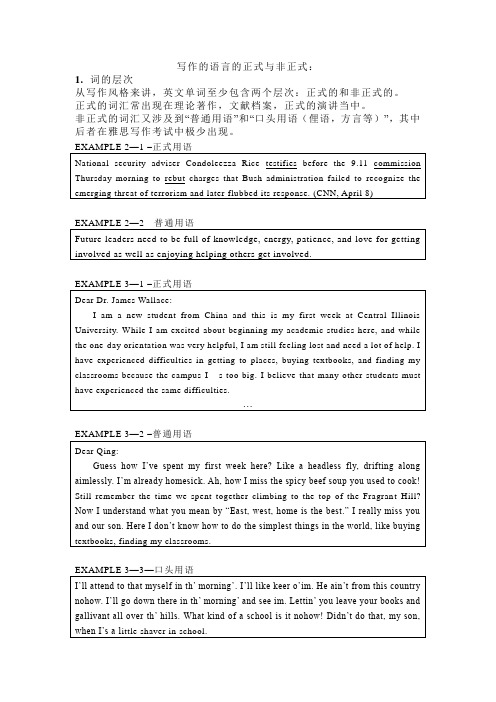
Future leaders need to be full of knowledge, energy, patience, and love for getting involved as well as enjoying helping others get involved.
Remote—Far
abandon---give up
accompany--- go with
adjacent --- next to
alternate --- change
attractive--- pleasing
available --- ready
accomplish--- carry out
EXAMPLE 3—1 –正式用语
Dear Dr. James Wallace:
I am a new student from China and this is my first week at Central Illinois University. While I am excited about beginning my academic studies here, and while the one-dayorientationwas very helpful, I am still feeling lost and need a lot of help. I haveexperienceddifficulties in getting to places, buying textbooks, and finding my classrooms because the campusIs too big.I believe thatmany other students must have experienced the same difficulties.
1 正规语体和非正规语体

在英语写作中,我们不仅要注意语法是否正 确,词汇是否恰当,更应该注意语体是否得 体(appropriate)。一般来说,书面语比较 正规(formal),而口语比较随便(casual)。 因此,在英语写作中,要用正规的书面语。
一、句子结构
1. 用被动语态 Informal: Please answer this question. Formal: The students are requested to answer this question.
4. 在正规语体中常用介词短语而在非正规语体中常 用副词 Informal: John spoke confidently. Formal: John spoke with confidence.
5. 用动名词短语
Informal: The doctor insisted repeatedly on a strict diet. The patient was disturbed by this. Formal: The patient was disturbed by the doctor’s insisting repeatedly on a strict diet.
Informal: The doctor arrived early. This pleased the nurse. Formal: The doctor’s early arrival pleased the nurse. Informal: The patient behaved abnormally. This worried the nurse. Formal: The patient’s abnormal behavior worried the nurse. Informal: The doctor perfected the operation rapidly. This astonished his colleagues. Formal: The doctor’s rapid perfection of the operation astonished his colleagues.
语体的划分
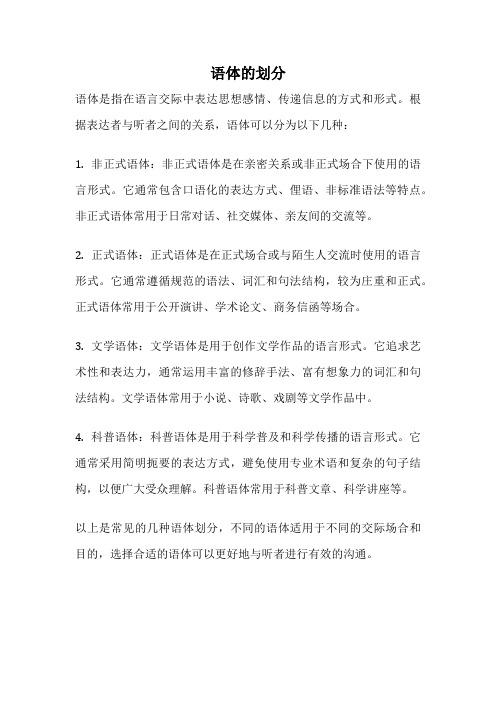
语体的划分
语体是指在语言交际中表达思想感情、传递信息的方式和形式。
根据表达者与听者之间的关系,语体可以分为以下几种:
1. 非正式语体:非正式语体是在亲密关系或非正式场合下使用的语言形式。
它通常包含口语化的表达方式、俚语、非标准语法等特点。
非正式语体常用于日常对话、社交媒体、亲友间的交流等。
2. 正式语体:正式语体是在正式场合或与陌生人交流时使用的语言形式。
它通常遵循规范的语法、词汇和句法结构,较为庄重和正式。
正式语体常用于公开演讲、学术论文、商务信函等场合。
3. 文学语体:文学语体是用于创作文学作品的语言形式。
它追求艺术性和表达力,通常运用丰富的修辞手法、富有想象力的词汇和句法结构。
文学语体常用于小说、诗歌、戏剧等文学作品中。
4. 科普语体:科普语体是用于科学普及和科学传播的语言形式。
它通常采用简明扼要的表达方式,避免使用专业术语和复杂的句子结构,以便广大受众理解。
科普语体常用于科普文章、科学讲座等。
以上是常见的几种语体划分,不同的语体适用于不同的交际场合和目的,选择合适的语体可以更好地与听者进行有效的沟通。
正式英语和非正式英语区别
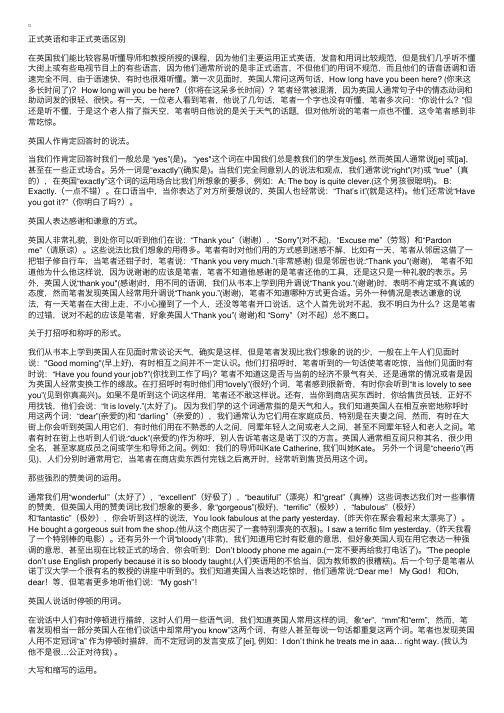
正式英语和⾮正式英语区别在英国我们能⽐较容易听懂导师和教授所授的课程,因为他们主要运⽤正式英语,发⾳和⽤词⽐较规范,但是我们⼏乎听不懂⼤街上或有些电视节⽬上的有些语⾔,因为他们通常所说的是⾮正式语⾔,不但他们的⽤词不规范,⽽且他们的语⾳语调和语速完全不同,由于语速快,有时也很难听懂。
第⼀次见⾯时,英国⼈常问这两句话,How long have you been here? (你来这多长时间了)? How long will you be here?(你将在这呆多长时间)?笔者经常被混淆,因为英国⼈通常句⼦中的情态动词和助动词发的很轻、很快。
有⼀天,⼀位⽼⼈看到笔者,他说了⼏句话,笔者⼀个字也没有听懂,笔者多次问:“你说什么?”但还是听不懂,于是这个⽼⼈指了指天空,笔者明⽩他说的是关于天⽓的话题,但对他所说的笔者⼀点也不懂,这令笔者感到⾮常吃惊。
英国⼈作肯定回答时的说法。
当我们作肯定回答时我们⼀般总是 “yes”(是)。
“yes"这个词在中国我们总是教我们的学⽣发[jes], 然⽽英国⼈通常说[je] 或[ja],甚⾄在⼀些正式场合。
另外⼀词是“exactly”(确实是)。
当我们完全同意别⼈的说法和观点,我们通常说“right”(对)或 “true”(真的),在英国“exactly”这个词的运⽤场合⽐我们所想象的要多,例如:A: The boy is quite clever.(这个男孩很聪明)。
B: Exactly.(⼀点不错)。
在⼝语当中,当你表达了对⽅所要想说的,英国⼈也经常说:“That’s it”(就是这样)。
他们还常说“Have you got it?”(你明⽩了吗?)。
英国⼈表达感谢和谦意的⽅式。
英国⼈⾮常礼貌,到处你可以听到他们在说:“Thank you”(谢谢),“Sorry”(对不起),“Excuse me”(劳驾)和“Pardon me”(请原谅)。
这些说法⽐我们想象的⽤得多。
正式语言与非正式语言
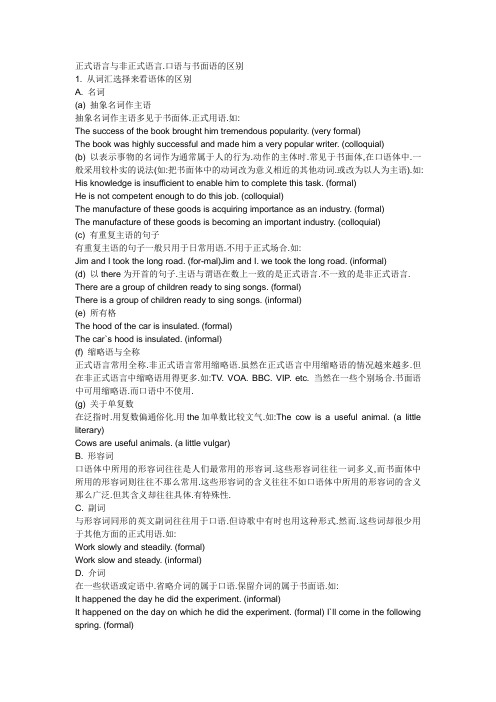
正式语言与非正式语言.口语与书面语的区别1. 从词汇选择来看语体的区别A. 名词(a) 抽象名词作主语抽象名词作主语多见于书面体.正式用语.如:The success of the book brought him tremendous popularity. (very formal)The book was highly successful and made him a very popular writer. (colloquial)(b) 以表示事物的名词作为通常属于人的行为.动作的主体时.常见于书面体,在口语体中.一般采用较朴实的说法(如:把书面体中的动词改为意义相近的其他动词.或改为以人为主语).如: His knowledge is insufficient to enable him to complete this task. (formal)He is not competent enough to do this job. (colloquial)The manufacture of these goods is acquiring importance as an industry. (formal)The manufacture of these goods is becoming an important industry. (colloquial)(c) 有重复主语的句子有重复主语的句子一般只用于日常用语.不用于正式场合.如:Jim and I took the long road. (for-mal)Jim and I. we took the long road. (informal)(d) 以there为开首的句子.主语与谓语在数上一致的是正式语言.不一致的是非正式语言. There are a group of children ready to sing songs. (formal)There is a group of children ready to sing songs. (informal)(e) 所有格The hood of the car is insulated. (formal)The car`s hood is insulated. (informal)(f) 缩略语与全称正式语言常用全称.非正式语言常用缩略语.虽然在正式语言中用缩略语的情况越来越多.但在非正式语言中缩略语用得更多.如:TV. VOA. BBC. VIP. etc. 当然在一些个别场合.书面语中可用缩略语.而口语中不使用.(g) 关于单复数在泛指时.用复数偏通俗化.用the加单数比较文气.如:The cow is a useful animal. (a little literary)Cows are useful animals. (a little vulgar)B. 形容词口语体中所用的形容词往往是人们最常用的形容词.这些形容词往往一词多义,而书面体中所用的形容词则往往不那么常用.这些形容词的含义往往不如口语体中所用的形容词的含义那么广泛.但其含义却往往具体.有特殊性.C. 副词与形容词同形的英文副词往往用于口语.但诗歌中有时也用这种形式.然而.这些词却很少用于其他方面的正式用语.如:Work slowly and steadily. (formal)Work slow and steady. (informal)D. 介词在一些状语或定语中.省略介词的属于口语.保留介词的属于书面语.如:It happened the day he did the experiment. (informal)It happened on the day on which he did the experiment. (formal) I`ll come in the following spring. (formal)I`ll come the following spring. (colloquialE. 代词(a) 口语中多省略作主语的代词.如:Haven`t seen you for ages! (informal)(b) 关于mine. his. yours. Ours当mine. his. yours. ours等物主代词作宾语或表语时.可用于书面语.也可用于口语.但如果这种物主代词(或名词所有格)作主语放在句首.并暗指表语名词所用的概念.那就是一种比较文雅的说法了.如:His (or Mr. Li`s) is a noble character.在日常口语中一般这么用:His (or Mr. Li`s) character is a noble one. / He has a noble character.但下面这类句子对书面语和口语都适用:Your teacher and mine are talking in the room.(c) we. I在一些正式场合.作者或演讲人为了表示谦虚.往往避免用I.而用we代替.如:As we showed a moment ago ... (formal)As I said a moment ago ... (not so formal)(d) you. we用we代替you是一种表示客气的语言.如:Don`t worry about your shoes! (imperative)Why don`t we not worry about your shoes. OK ? (polite)(e) you. one在翻译中文"任何人"."谁都"等时.译成one为formal language.译成you为informal language.如:One must love one`s country. (formal)You must love your country. (informal)(f) 关于I. me. he. him. etc.He says she saw you and me. (formal)He says she saw you and I. (informal)F. 动名词在书面语中.一般用物主代词或名词所有格来修饰动名词短语.以表示行为者.如:Mr. Li dislikes Zhang Hui`s coming home late.There will be little chance of my visiting the place again.Li Wen`s falling ill suddenly gave me a surprise.口语中一般以代词的宾格或名词普通格加分词.for加宾语加不定式.从句.独立句等方式表达.如:Mr. Li dislikes Zhang Hui coming home late.There will be little chance for me to visit the place again.Li Wen fell ill suddenly. This gave me a surprise.G. 关于缩写用缩写形式多为非正式语言.而用非缩写形式多为正式语言.如:do not. we are. I am. I have. there is. cannot. will not等多见于正式语言.而don`t. we`re. I`m. I`ve. there`s. can`t. won`t 多见于非正式语言.exam. bike等多用于口语.examination. bicycle等多用于书面语.oh. dear. why. well等是口语中常见的感叹词.2. 从句法来看语体的区别A. 修饰语在书面文字中.修饰语可以与中心词相隔较远.修饰语也可以较长.而在口语中则相反.如: There exist complex computations in science and engineering which people are unable to make. (written)There are complex computations in science and engineering. and people are unable to make those computations. (colloquial)B. 句子的长短一般来说.书面语句子较长.口语句子较短.(a) 议论文.商业或法律公文等书面语不仅常用较长的修饰语.而且有时用较长的插入语.甚至插入语中还有插入语.但在一般的口语中则不用较长的插入语.常用的较短插入语有:of course. for example. I believe. I think. you see. you know. to be frank. etc.(b) 在书面语中.一个句子有时有好几个关系代词,而口语中关系代词则用的极少.往往被分成几个简单句.如:These needles. which were made of fish-shaped pieces of iron that floated on water. were acted on by the earth`s magnetic field. (formal)These needles were made of fish-shaped pieces of iron that floated on water. They were acted on by the earth`s magnetic field. (informal)C. 关于时态在现在的口语中.有时用过去时代替现在完成时.如:-Is anybody using this chair?-No. I saved it for you.在口语中常用现在时代替将来时.如:She is coming tomorrow.在口语中有时用一般现在时说明一个已经发生了的动作.如:He says it is very important.D. 虚拟语气(a)不够熟悉的人之间对话.或在正式场合演讲.对话时.一般用虚拟语气来陈述自己的看法.提出请求或邀请.提出建议或劝告.提出问题.如:If Mr. Wang was here now. he would tell you about it. (informal)If Mr. Wang were here now. he would tell you about it. (formal)(b) 有一些表示主观愿望和情绪的形容词.如desirous等要求后面的状语从句的谓语动词用虚拟语气.这种结构主要用于书面语中.口语中往往用不定式来代替这种从句.如:He was anxious that we should stay for dinner. (formal)He was anxious to have us stay for dinner. (informal)E. 语序在书面语中.为了使句子平衡对称.或为了表示强调.常把状语.表语.宾语等成分放在句首.并将主谓次序颠倒过来,而口语体则一般用自然语序.F. 关于省略(a) 在正式文字或正式场合的对话中.一般要用完整的句子.在口语中用省略句较多.主要是为了节省时间.使对话自然.生动.简洁.有力.如:Where to go now? Why not do it this way?(b) 在正式语言中.所省略的部分一般都是前边出现过的.如:He had finished the work and gone home.(c) 关系代词在限定性定语从句中做谓语动词宾语或介词宾语时.在口语中一般省去.如: The girl you spoke to just now is my sister.(d) 宾语从句前的that在口语中往往省去.表语后面的从句之前的that在口语中也常省去.如: He said he would go to London.I`m afraid he is right.G. 主谓语的一致性在有些情况下.非正式语言中常按意思决定动词的单复数.所以主语和谓语在数上可能不一致.如:Neither he nor his wife have arrived. (informal)Neither he nor his wife has arrived. (formal)(David Park designs & teaches IELTS courses for individuals & groups. He was contracted by the British Council to provide this article.)A student preparing for IELTS (International English Language Testing System) sent me this query: “I don’t know if ‘spark off’ is a f ormal word or not. How can I tell the difference between formal and informal words?” Here’s what I said to her in my reply:English has three main styles: formal, informal and popular.Formal EnglishFormal English is mainly used in writing. This style is academic in tone and is commonly used in academic textbooks, most university essays, business letters and contracts.In the case of speaking, formal English is usually only used for official or serious occasions, e.g., to formally welcome guests at a university graduation ceremony.Formal English uses more complex vocabulary than everyday speech. For example, it uses many “bigger” words that aren’t normally used in conversation. Examples are multi-syllable words like compensate, ascend and interrogate. It also prefers one-part verbs (e.g., establish) instead of simpler, phrasal verbs (e.g., set up). Slang and colloquial vocabulary are avoided.When formal English is used in writing, sentences tend to be long and complex, and grammar rules are followed strictly. It tends to be impersonal (or neutral), often using impersonal pronouns like it and passive verbs. Contracted and abbreviated forms of words are usually avoided.Informal & popular EnglishInformal English is the language spoken by most people every day. It’s also widely used in emails and letters to friends.Speakers of informal English aren’t very concerned about their vocabulary. For example, informal English uses many short words (e.g., fire, climb and ask), much colloquial vocabulary (e.g., stuff, a lot of, thing and sort of) and multi-part verbs (e.g., set up instead of establish). Informal English is also more relaxed about grammar rules than formal English, using simpler grammatical structures and loosely-connected sentences and phrases.When used in writing, informal English uses first and second person points-of-view (e.g., I, you and we) to create a more personal style than formal English. Contractions (e.g., it’s instead of it is)are also very common. As well, informal English tends to use shorter sentences than in more formal writing, and the more formal punctuation marks − the semi-colon (;) and colon (:) − are usually avoided.Popular English is rarely used in writing, being used mostly in spoken English. It includes a good bit of slang. Slang is words or expressions that are very informal and are not considered suitable for polite speech or more formal situations. Slang is often used only by particular social groups or professions.More on phrasal verbsWhen people speak or write informally, they often use phrasal verbs (also called multi-word or multi-part verbs). Here are some examples. The formal, one-word verb with the same meaning is in brackets.Phrasal verbs & single-word equivalentsask for (request) go down with (contract)set up (establish) deal with (handle)find out (discover) take in (deceive)Phrasal verbs are very common in spoken English. However, they’re usually less formal than their one-word verb equivalents.In formal writing, writers often prefer to use single-word verbs, such as examine or devise, rather than phrasal verbs, such as look at or come up with. Compare the pairs of verbs in the next table.Though there’s a tendency to use fewer phrasal verbs in formal language, it’s not wrong to use them. Nevertheless, if there’s a one-word verb that’s more formal, then use it.Don’t think that a few phrasal verbs in your IELTS writing will make it too informal. In fact, there are many situations - even in quite formal texts - when a phrasal verb is the most natural-sounding way of expressing an idea. For instance, put on is much more natural than the formal, single-word equivalent don.InformalMore formalHe checked up on his accountant. He investigated his accountant.They put up with their neighbours. They tolerated their neighbours.She caught on very quickly. She understood very quickly.She made up for it with an early night. She compensated for it with an early night.He went down with a fever. He contracted a fever.The cost of living went up. The cost of living increased/rose.Telling the differenceIt’s usually easy to decide if a word is informal or formal. Informal words are those common, ordinary and familiar words that people use every day, whereas formal words tend to be the more “serious” and less frequently used words. Often, formal words are longer than informal words. Single-word verbs are also usually more formal than their phrasal verb equivalents.For instance, saying something is en ormous is formal, but saying it’s whopping is informal. Phrases like on the one hand or as indicated above are formal, but phrases like by the way or that reminds me are informal. Note that some informal words are more formal than other informal words. The informal verb understand, for example, is more formal than the informal verb get. However, both are less formal than the formal verb comprehend.IELTS uses a semi-formal styleThe IELTS website says academic essays may use “a neutral or slightly formal style of writing.”This means your IELTS academic writing may use slightly less formal vocabulary (e.g., phrasal verbs like spark off instead of cause) as well as words that are more formal. It may also use the complex grammar of formal English, or it may use slightly simpler grammatical structures.However, the more formal the vocabulary and the more complex the grammar is, the higher the IELTS score. In the case of vocabulary, for instance, the scoring scheme gives higher scores when “less common” or“uncommon lexical items” (words or phrases) are used − which is what formal vocabulary is. Click here to see the scoring scheme.Here’s my advice for vocabulary for academic essays in the IELTS exam:Use a more formal one-word verb if it sounds more appropriate than its phrasal verb equivalent. Avoid using a personal or conversational style (as if you’re talking to the examiner). Therefore, try not to use words like I, me, my, you, we, us and our. Though these words are widely used in informal writing and in spoken English, they’re generally thought to be too personal and too casual for formal, academic writing.If you wish, you may use the pronoun I to introduce your opinions. However, I recommend that you limit its use to the introduction and the cl osing paragraph. That way, you’ll avoid the risk of making your essay sound too conversational or overly personal.Avoid words or phrases used mainly in normal conversation as they’re usually not suitable for usein academic writing. Dictionaries often i dentify these words with the label “informal.” In your essay, use a more formal equivalent. Here are some examples:Avoid Usekids childrenOK all right; acceptablea lot of much; manyheaps many; a great dealNever use colloquial English or slang. Colloquial English is a type of informal English, and it includes words such as gonna or wanna, and phrases such as ain’t nothin’ and dead as a doornail. Dictionaries usually mark colloquial words and phrases with a label like “colloq.” Because colloqu ial English and slang are usually spoken rather than written, they’ll make your academic writing sound too conversational and so less credible.Although it’s usual to contract words in spoken and informal written English (e.g., can’t, won’t, shouldn’t and hasn’t), it’s better to avoid using any contractions in your academic essay.Avoid abbreviating words in academic writing. Don’t say yrs, e.g. (which stands for the original Latin exempli gratia and means “for example”) or i.e. (which stands for the orig inal Latin id est and means “that is”). Instead, write the words in full using their English equivalents (years, for example and that is).Glossaryslang (noun) - informal language that is usually spoken and used especially by certain groups of peoplecolloquial (adjective) - words or expressions that are informal and more suitable for use in speechcontract (verb) - to shorten somethingtendency (noun) - a likelihood to do somethingDiscussionWhat are the three main styles of English? Which style should you use for your IELTS academic writing? Why?Apart from using many short words in informal English, what other differences can you point out between informal and formal English?Have you checked the scoring scheme for the writing test? How will you evaulate your own writing in the areas of lexical resource and grammatical range and accuracy?After reading this article, can you compile a list of words or phrases that should not be used whenwriting your IELTS academic essay?DownloadsPlease right click on the title and select 'Save Target As...' from the menu to save the file to your computer.。
英语中的语体
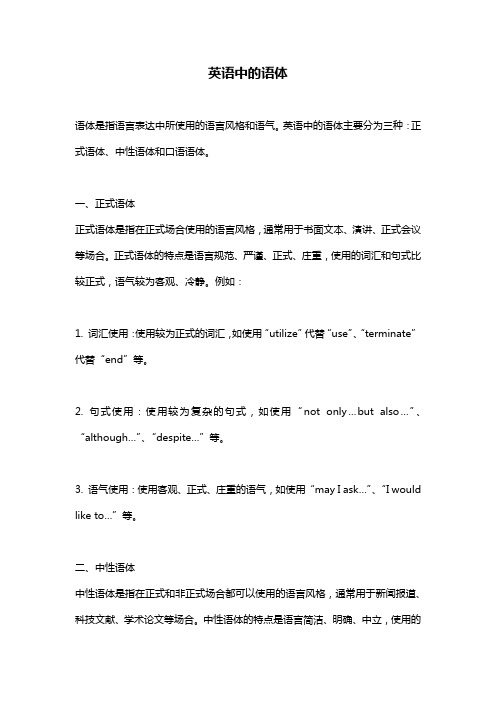
英语中的语体语体是指语言表达中所使用的语言风格和语气。
英语中的语体主要分为三种:正式语体、中性语体和口语语体。
一、正式语体正式语体是指在正式场合使用的语言风格,通常用于书面文本、演讲、正式会议等场合。
正式语体的特点是语言规范、严谨、正式、庄重,使用的词汇和句式比较正式,语气较为客观、冷静。
例如:1. 词汇使用:使用较为正式的词汇,如使用“utilize”代替“use”、“terminate”代替“end”等。
2. 句式使用:使用较为复杂的句式,如使用“not only…but also…”、“although…”、“despite…”等。
3. 语气使用:使用客观、正式、庄重的语气,如使用“may I ask…”、“I would like to…”等。
二、中性语体中性语体是指在正式和非正式场合都可以使用的语言风格,通常用于新闻报道、科技文献、学术论文等场合。
中性语体的特点是语言简洁、明确、中立,使用的词汇和句式比较普通,语气较为客观、中立。
例如:1. 词汇使用:使用普通的词汇,如使用“use”代替“utilize”、“end”代替“terminate”等。
2. 句式使用:使用简单明了的句式,如使用“and”、“but”、“because”等。
3. 语气使用:使用客观、中立的语气,如使用“according to…”、“it is believed that…”等。
三、口语语体口语语体是指在非正式场合使用的语言风格,通常用于日常交流、社交场合、非正式会议等场合。
口语语体的特点是语言随意、自由、轻松,使用的词汇和句式比较口语化,语气较为亲切、自然。
例如:1. 词汇使用:使用口语化的词汇,如使用“use”代替“utilize”、“end”代替“terminate”等。
2. 句式使用:使用简单明了的句式,如使用“and”、“but”、“because”等。
3. 语气使用:使用亲切、自然的语气,如使用“hey”、“what’s up”等。
试谈正式英语和非正式英语在词汇-语法上的特点
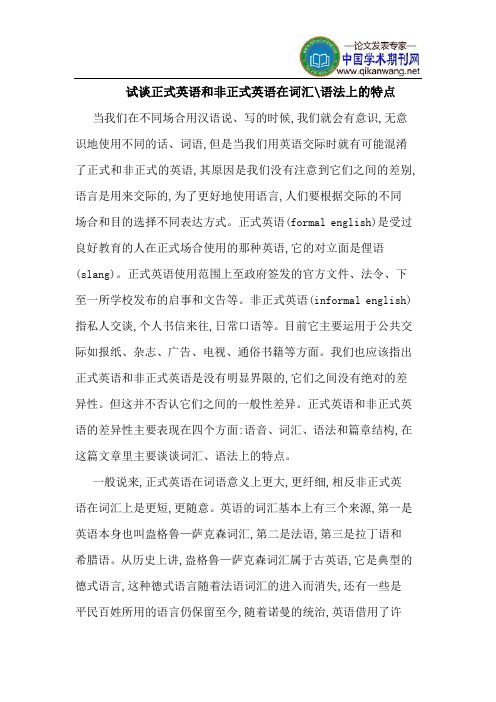
试谈正式英语和非正式英语在词汇\语法上的特点当我们在不同场合用汉语说、写的时候,我们就会有意识,无意识地使用不同的话、词语,但是当我们用英语交际时就有可能混淆了正式和非正式的英语,其原因是我们没有注意到它们之间的差别,语言是用来交际的,为了更好地使用语言,人们要根据交际的不同场合和目的选择不同表达方式。
正式英语(formal english)是受过良好教育的人在正式场合使用的那种英语,它的对立面是俚语(slang)。
正式英语使用范围上至政府签发的官方文件、法令、下至一所学校发布的启事和文告等。
非正式英语(informal english)指私人交谈,个人书信来往,日常口语等。
目前它主要运用于公共交际如报纸、杂志、广告、电视、通俗书籍等方面。
我们也应该指出正式英语和非正式英语是没有明显界限的,它们之间没有绝对的差异性。
但这并不否认它们之间的一般性差异。
正式英语和非正式英语的差异性主要表现在四个方面:语音、词汇、语法和篇章结构,在这篇文章里主要谈谈词汇、语法上的特点。
一般说来,正式英语在词语意义上更大,更纤细,相反非正式英语在词汇上是更短,更随意。
英语的词汇基本上有三个来源,第一是英语本身也叫盎格鲁—萨克森词汇,第二是法语,第三是拉丁语和希腊语。
从历史上讲,盎格鲁—萨克森词汇属于古英语,它是典型的德式语言,这种德式语言随着法语词汇的进入而消失,还有一些是平民百姓所用的语言仍保留至今,随着诺曼的统治,英语借用了许多法语单词,这些词汇主要使用在宫庭,它们是关于骑士、政府、道德、文学等方面的内容。
在文艺复兴时期英国作家、学者借用了很多拉丁、希腊和意大利词汇,诸如“formula”,“geometry”,“philosophy”“tragedy”等,这些词汇通常运用在文化和学术界。
一般而言,盎格鲁—萨克森词汇是短小而简单的,使用在非正式场合。
法语词汇表达了一种严肃感,而希腊词汇则是使用在文学和学术界。
因此法语和希腊词汇是被使用在正式场合。
分别用正式和非正式语体写一篇英语作文
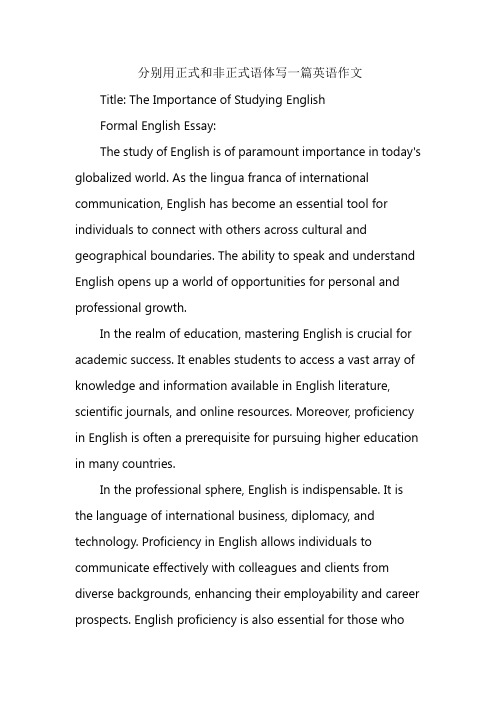
分别用正式和非正式语体写一篇英语作文Title: The Importance of Studying EnglishFormal English Essay:The study of English is of paramount importance in today's globalized world. As the lingua franca of international communication, English has become an essential tool for individuals to connect with others across cultural and geographical boundaries. The ability to speak and understand English opens up a world of opportunities for personal and professional growth.In the realm of education, mastering English is crucial for academic success. It enables students to access a vast array of knowledge and information available in English literature, scientific journals, and online resources. Moreover, proficiency in English is often a prerequisite for pursuing higher education in many countries.In the professional sphere, English is indispensable. It is the language of international business, diplomacy, and technology. Proficiency in English allows individuals to communicate effectively with colleagues and clients from diverse backgrounds, enhancing their employability and career prospects. English proficiency is also essential for those whowish to engage in global research, collaborate with international teams, and participate in global conferences and seminars.Furthermore, the study of English promotes cultural understanding and empathy. By learning about the culture, literature, and history of English-speaking countries, individuals can develop a deeper appreciation for the diverse perspectives and experiences of others. This cultural literacy fosters a sense of global citizenship and interconnectedness.In conclusion, the study of English is of utmost importance in today's interconnected world. It empowers individuals to communicate, collaborate, and connect with others, thereby fostering personal and professional growth. Mastering English is not only an academic pursuit but also a means to engage with the global community and contribute to a more inclusive and interconnected world.中文翻译:标题:学习英语的重要性在当今全球化的世界中,学习英语具有极其重要的意义。
英语课程电子邮件正式与非正式用语区别
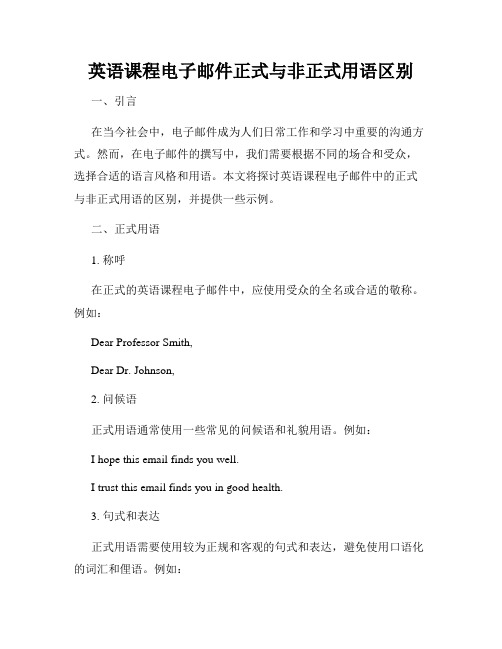
英语课程电子邮件正式与非正式用语区别一、引言在当今社会中,电子邮件成为人们日常工作和学习中重要的沟通方式。
然而,在电子邮件的撰写中,我们需要根据不同的场合和受众,选择合适的语言风格和用语。
本文将探讨英语课程电子邮件中的正式与非正式用语的区别,并提供一些示例。
二、正式用语1. 称呼在正式的英语课程电子邮件中,应使用受众的全名或合适的敬称。
例如:Dear Professor Smith,Dear Dr. Johnson,2. 问候语正式用语通常使用一些常见的问候语和礼貌用语。
例如:I hope this email finds you well.I trust this email finds you in good health.3. 句式和表达正式用语需要使用较为正规和客观的句式和表达,避免使用口语化的词汇和俚语。
例如:I am writing to inquire about the English course you offer.I would like to request further information regarding the curriculum.4. 结尾语在正式用语中,需要使用适当的结尾语表达感谢和礼貌。
例如:Thank you for your attention to this matter.I appreciate your assistance in this regard.三、非正式用语1. 称呼在非正式的英语课程电子邮件中,可以使用受众的名字或名字的缩写。
例如:Hi John,Hello Mary,2. 问候语非正式用语可以使用一些轻松的问候语和亲切的用语。
例如:I hope you're doing well.How are you?3. 句式和表达非正式用语可以使用更为口语化和日常化的句式和表达方式。
例如:I'm emailing to ask about the English course you mentioned.Can you give me more information about the curriculum?4. 结尾语在非正式用语中,可以使用更加随意的结尾语表达感谢和问候。
语体的概念

语体的概念
语体的概念
语体是指语言表达的方式和风格。
在不同的语境中,人们会使用不同的语体来表达自己的意思。
通常,人们使用正式、非正式或口语等不同的语体来适应不同的社交场合和文化环境。
一、正式语体
正式语体通常用于正式场合,如商务会议、学术研讨会、政府官方文件等。
这种语体要求使用规范化、准确和严谨的词汇和句式,以确保信息传递的精准性和权威性。
在正式场合中,使用正确的称呼和礼节用语也是必要的。
二、非正式语体
非正式语体通常用于日常生活中,如与家人朋友聊天、写日记等。
这种语体相对宽松随意,允许使用俚语、口头禅或缩略词等非标准化表达方式。
此外,在非正式场合中,人们往往更加注重情感表达和互动交流。
三、口头禅
口头禅是指一些习惯性地出现在人们口中并反复使用的短句或单词。
这些短句或单词可能是某个特定领域的专业术语,也可能是某个地区或文化群体特有的口头表达方式。
在不同的场合中,人们可能会使用不同的口头禅来表达自己的情感和态度。
四、语体转换
在实际生活中,人们需要根据不同的社交场合和文化环境来灵活运用不同的语体。
因此,语体转换成为了一种重要的语言技能。
通过适时地调整词汇、句式和表达方式等方面,人们可以更好地适应不同的场合和交流对象。
五、总结
综上所述,语体是指语言表达方式和风格。
在实际生活中,人们需要根据不同场合和文化环境来选择适当的语体,并通过灵活运用各种技巧来实现语体转换。
掌握好这些技能可以帮助人们更好地沟通交流,并在社交场合中展现出自己最佳的形象。
正式英语与非正式英语
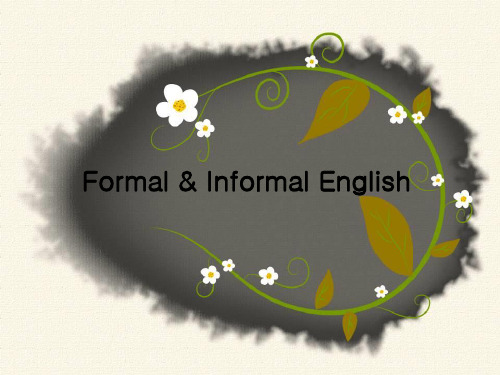
从句比不定式的形式正式 It is important that we should do it (for us to do it). It seems that he is a teacher. (He seems to be a teacher.)
➢不省略的形式比省略的形式正式。
I know that he is a famous writer. He is a person whom I have known for several years.
➢介词前提比介词结尾的句子正式。 He is a person on whom we can rely (whom we can rely o n).
2.短语动词: pick up,give up,go on with ,fall out,look into
正式使用单个动词
正式: 1.词汇: explode,reduce,position, fatigurd
2.短语动词: choose,abandon, continue,quarrel,investgate
(3) 口语词。
指非正式谈话和写作中所使用的亲昵的词语、短语、习语等。这些词语和习语 被认为不适合在礼貌的会话或正式通信场合中使用。
(4) 理语词。
最不正式的一种语言。供青年人、社会行业之间交际时所使用的“ 行话” 。 对此类词语的使用要十分慎重, 尤其不宜在正式的社交场合中使用。但是, 由于理语 具有创新、生动和传播迅速的特点, 因此, 目前, 便语似呈使用范围日渐扩大的趋势。
- 1、下载文档前请自行甄别文档内容的完整性,平台不提供额外的编辑、内容补充、找答案等附加服务。
- 2、"仅部分预览"的文档,不可在线预览部分如存在完整性等问题,可反馈申请退款(可完整预览的文档不适用该条件!)。
- 3、如文档侵犯您的权益,请联系客服反馈,我们会尽快为您处理(人工客服工作时间:9:00-18:30)。
,
( 2 )
a
a
t h
h
n
a s
d
,
( 3 )
e
a
ld f di
s e
.
m
th
e e
.
a
h
s u
a
s
k i
t
e
k
e
d
s
t h
e o s
e
b
u
e
k i
e
e
t
”
(
e r e s
4 )
e s a
E Sm i t h i I
n
h
a s
o
s e
t t
a
m
e
e n o
t
r
m n t
w h i
u n e
e a
t p
s e
,
r
e
r
i d
n
g
t
y
o
o
t h
u e
e e
t i
a r
v
e n
f
o n
a
o
d
s
e
e
x
p
r e
s
i
o
T h i
r
s
1
5
i m p li
n
e
b
e
s
h
e
p
o
p t i
u
l
d w
a
e
fi
o
n
i ti
a s
f
d
t y l
a n
a s
s a v
i
n
g
t h
r
e
i g ht
s
,
t h i
g
a
i
y t
e a
d i
o
a
di
e
d,
n
n
d
p h
s
s
u
b
ti t
s
u
t
、
o s
a
t l
,
e
r
,
l
r
u
n
a
n
t
n
P
r e s
s
n
e
(
w
e
a
e u
e
m i
e
m )
n
S ( 3 )
a e
a
i n y
一
b
i
a
e
f
e
5
t
a
t
e
m
e n
t
i
w hi
a
s
e
h
n
t h g y
,
,
r
i t
o
e
r
产
f
a
e
l
t
g
e ;
s
藻
r
o
n o
t
a
di T
n
a ,
o
t
l
i o di o fa t h
e e
t
,
d言 S ( 4 )
, “
`
e
m
d
o
p 10 y th
e
s
la k
p
e
o
“
ll
g
e
u
i
l
St y l
e
" 0
l dm
y
一 , h 5 1 o r
.
l r
“
r
kie k
a
e
b
r
位 e
t
f f
o
r
di
d f
a
,
_
W
e r r
m i gh t
.
f
e
la
a
g
u
a
g
s
n e
d
a
,
a s n
w
s
n r i
r
v
e
t h i
n s
r o
u
g h ti
v
t h
e
da y
,
5 0
t y p
e s
o
f
ti
o
la
n
n
g
a
w
e
r e
u
i
e
u
g
h f
n
t
e r
p
r
r
e
ti
o
n
,
t h t
o
e
W
e s o n
o
r
d
y
’ , s
ty l
e ”
h h
a s
a
f
n
a
i
r
l
e
y
u
n
s n
e o n
e r s
i
v
l m
e o
e a n
g t
,
:
i t b
y
r e
e
f
e r s
t h
e r
w
,
a
i
o n r
n
w h i
a
e
la P 1 m
s o u 5
g p
r
i ti
a
w
e a n
r
k 1
.
w
r
a
r
i
e
h
e r
a
e e
n
f
e
w h
a n
t
o
m d I
l i
n
o r
i
u r
n
f
o
r
m
a
l
s
s
t y l
s
e
5
a n
d
o
w
i t
e a n
b
e
b
e s
t
n a
l了
s
d
d
s e
o
s
E
o s
n
g li g
h
t
u
d y
n
n
i t
t
r o
m
v
t
a
e n
e r a
l i i
u a
g
15
u
a
e
d
’
i
s 0
n
a
g i
e
’
e n 5
n
t
e x a
a r
g i
e
s
v
e n r e
P
t
e e
f
n
g i
e
v e n
r
o e
、e
,
d
e v
g t y l
1
e
g i
v
e n
m f
e r
o
t
i
d
e
m ff
e a
i
g
e s
w h
s
n
o
i t
u s
石
o
i f
e
n
毯 n
a
lu
s
a
ti
n
.
v
s e n
u
t h
s
m f
e a e
fa
t
e a
t
:
t h
a
t
Jo h
e r e n
n
h h
e r
d
B
e
t h
a
w
e r
d
h
e
x
t h
e
e
r e
di f f
e
t
.
e a e
e a
Th
s
,
m h
tt
1 t
5
t h
e
e
e
s a
m
r
b
e n
t
t h
n a
m
a
n n
e r
h
t t
r
a
s
h
e
.
a
n
g
e
d
e
n
o
t h
w
o
r
d
x
e a e
s e n
e n
1
5
w
n
i t t ti
i
s
di f f
e
e r e n
s
t y l
e s
T h
r a
St y le
o
f
s (
) i
s
p
o
m p
o u
s
a
n
d
s e
t
e n
o
u
,
i t
l
e a
r
ly
i
t
o
i
s e
111
t
3
h 1m p l e
e
t
r
t
,
r
t b让 t
h
s
h
ti l l
